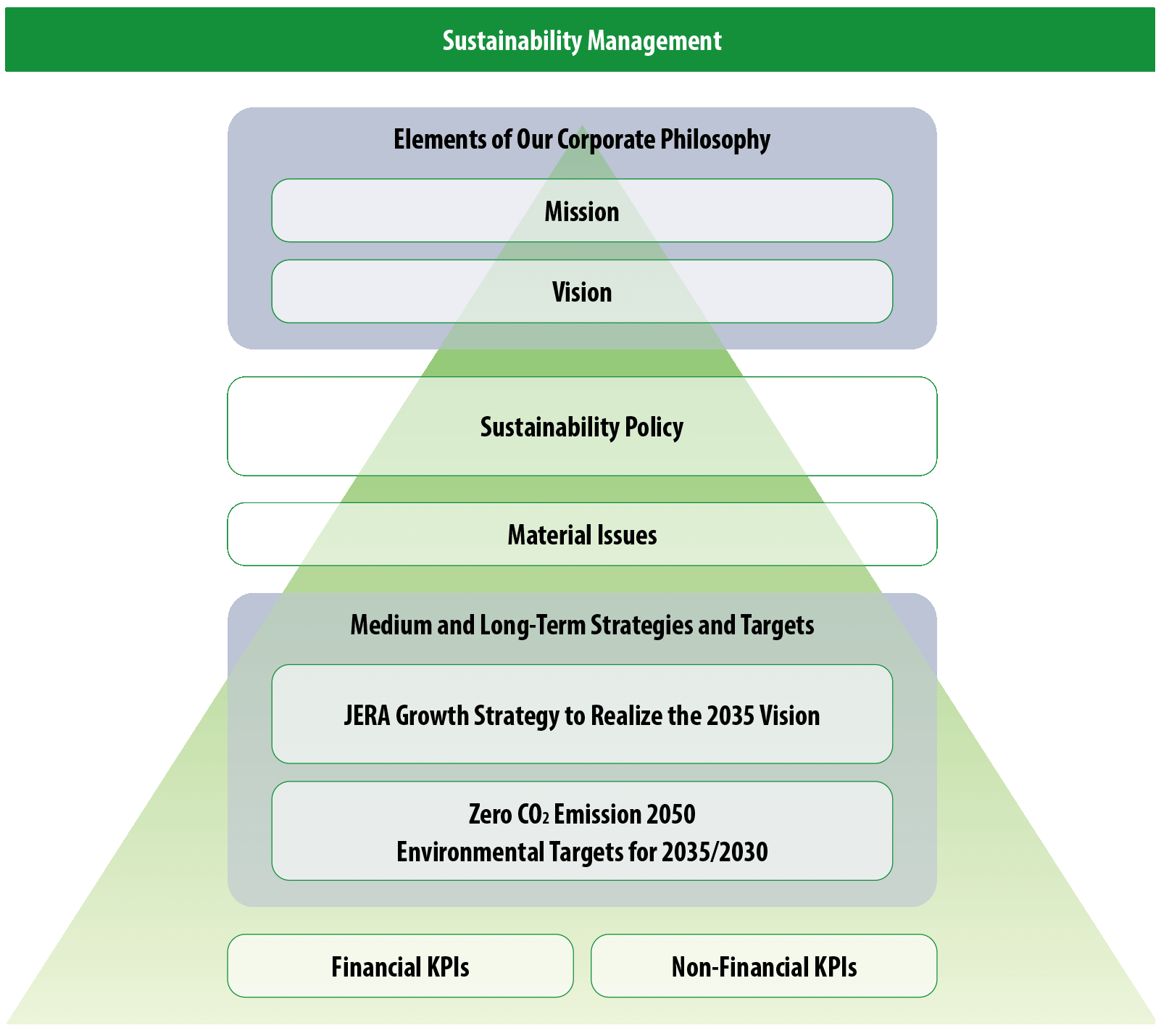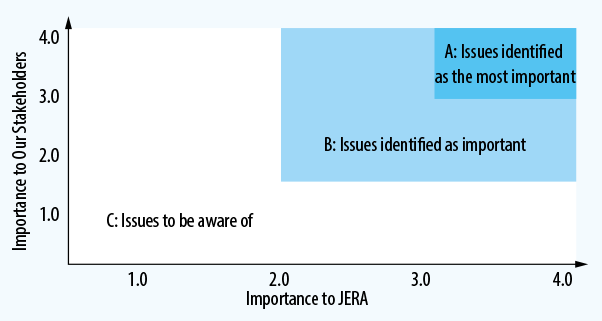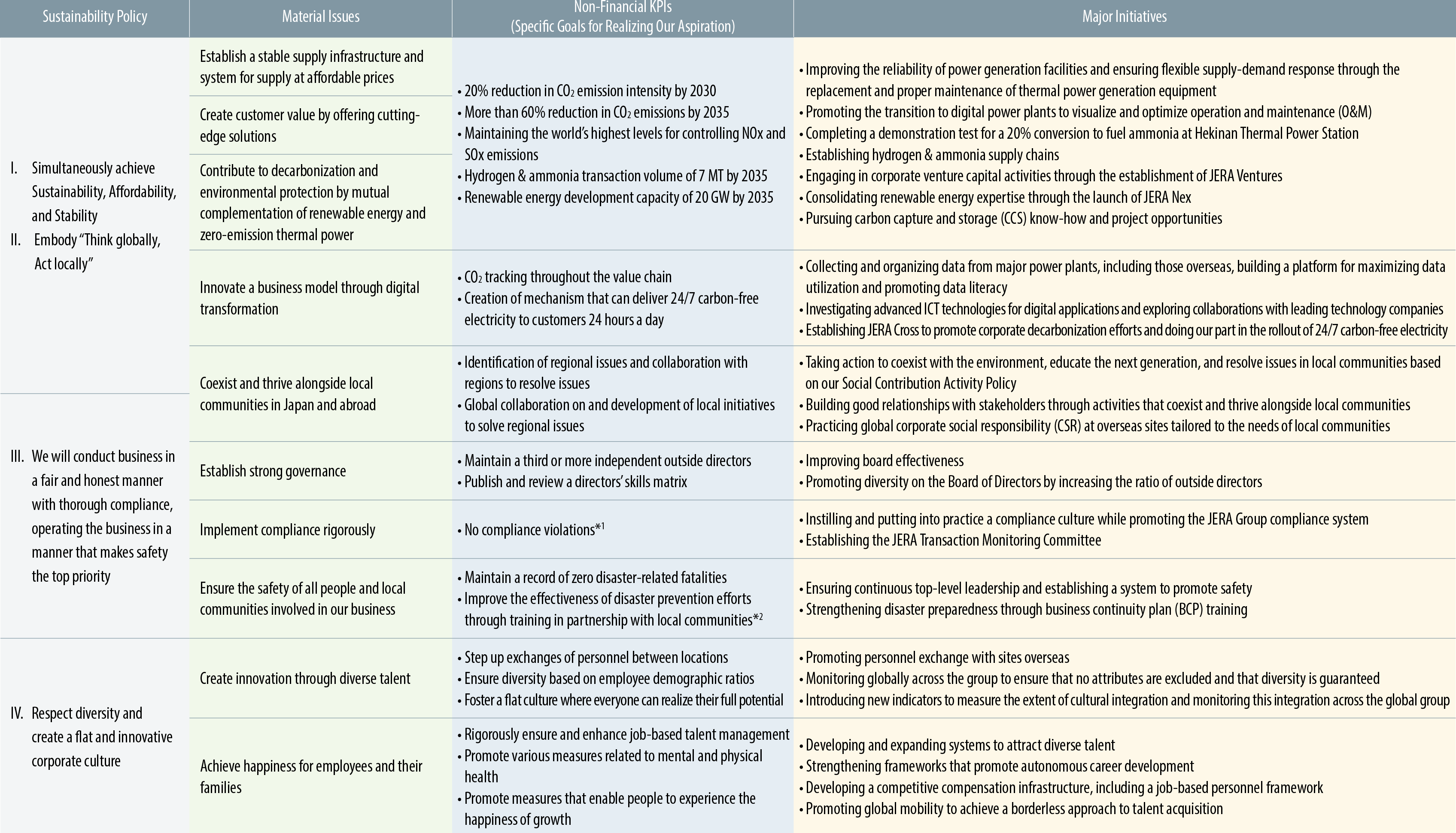Material IssuesSustainability
JERA identified and published our 22 material issues starting in 2020 based on the goals set forth in our April 2019 business plan.
Since then, we have refined this list to nine, making necessary revisions. We continue to review these issues regularly in response to changes in both internal and external environments. Recently, we have again revised our material issues in line with the JERA Growth Strategy to Realize the 2035 Vision, announced in May 2024, and the newly established JERA Group Sustainability Policy. The formulation of the said basic policy and revision of materiality are reported to the Sustainability Promotion Committee (chaired by the President, Director, CEO and COO), the Executive Committee and the Board of Directors for approval.
We will continue to implement a rigorous Plan-Do-Check-Act (PDCA) cycle of sustainability management by closely monitoring progress on non-financial KPIs and further enhancing stakeholder engagement. Within this newly outlined sustainability management system, we are committed to sustainably and steadily working toward achieving our mission and vision while maximizing corporate value.
How We Identify Material Issues

How We Set Our Material Issues
We verify Material Issues once a year after they are identified, it, and if necessary, we will update the Material Issues and will set the KPIs.
Identify Issues
We composed a list of 59 issues pertinent to our company following an analysis of the industry environment, our business strategies, and other factors.
Reference Guidelines
- ISO 26000
- SDGs
- GRI
- SASB
- FTSE
- Material issues of industry peers
Assess Importance and Relevance
We evaluate each of the 59 issues identified in Step 1 in terms of their importance to the company, stakeholders, and society, as well as their relevance to factors like company strategy and stakeholder opinion.
Evaluation Methods
- Importance to Our Stakeholders
Quantitative assessment of importance to our customers, business partners, local communities, shareholders and investors, and employees - Importance to JERA
Quantitative assessment based on impact on revenue/costs, reputation, compliance, and alignment with business strategy
Identify Material Issues
The Material Issues verified in Step 2 are identified with the approval of the Sustainability Promotion Committee (chaired by the President, Director, CEO and COO), taking into consideration both actual and potential positive and negative impacts on people and the environment and the degree of dependence on people and the environment, as well as the opinions and recommendations of external stakeholders, including investors.
Method of Identification
Issues were categorized into three categories: A: issues identified as the most important; B: issues identified as important; and C: issues to be aware of. Issues in categories A and B were identified as material issues

Revise Material Issues
Guided by the new corporate vision and JERA Environmental Target 2035 announced in May 2022, we abstracted and reorganized the material issues first formulated in 2020 into nine issues, which were considered and approved by The Sustainability Promotion Committee. In FY2024, we had verified the validity of the nine Materiality Issues and reorganized into ten.
Focus of FY2024 Revisions
- Number of Material Issues:
Materiality was subdivided into 10 items from 9 items. - Focus of Revisions:
Based on the JERA Growth Strategy for Achieving the 2035 Vision announced in May 2024 and the newly formulated JERA Group Sustainability Policy, the Sustainability Promotion Committee (Chair: President, director, CEO and COO) reviewed the appropriateness of the 9 Materiality Issues and approved the reorganization into 10. The committee approved reorganization to 10 Materiality Issues.
Linkage between Our Sustainability Policy, Material Issues, and Non-Financial KPIs


- Noncompliance that constitutes misconduct equivalent to a crisis or emergency
- Covers domestic thermal power plants

